American actor Richard Gere (1949) has been hailed as The Sexiest Man alive and a humanitarian, but he is foremost a good actor. He shone in such box office hits as American Gigolo (1980), An Officer and a Gentleman (1982) and Pretty Woman (1990). For portraying Billy Flynn in the Academy Award-winning musical Chicago (2002), he won a Golden Globe Award and a Screen Actors Guild Award as part of the cast.
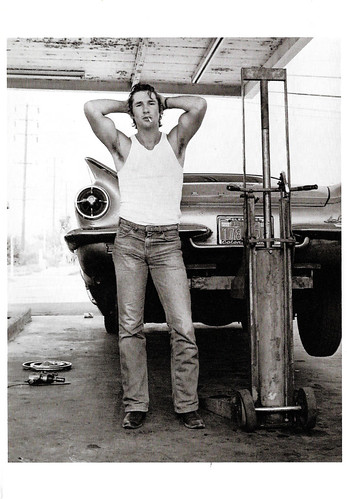
American postcard by Fotofolio, N.Y., N.Y. Photo: Herb Ritts. Caption: Richard Gere, San Bernardino, 1979. Courtesy Fahey / Klein Gallery Los Angeles. Proceeds of the sale of this card benefit The American Foundation For Aids Research.
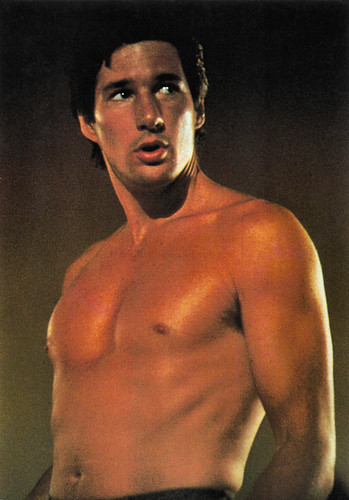
French postcard by Editions Librairie Images'in, no J 19. Photo: publicity still for American Gigolo (Paul Schrader, 1980).
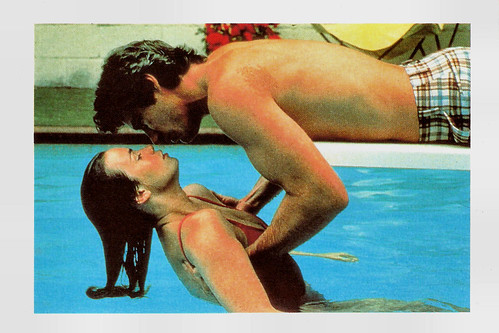
Italian postcard by Ediber-Angelus. Photo: publicity still for Breathless (1983) with Valerie Kaprisky.

Italian postcard in the Solo Belli series by Edizioni Eden, Milano, no. 1. Julia Roberts and Richard Gere in Pretty Woman (Garry Marshall, 1990).
Richard Tiffany Gere was born in 1949 in Philadelphia, Pennsylvania, USA. He was the second of five children of Doris Ann (Tiffany), a homemaker, and Homer George Gere, an insurance salesman, both Mayflower descendants. Gere had a strict Methodist upbringing. He started early as a musician, playing several instruments in high school and writing music for high school productions. He graduated from North Syracuse Central High School in 1967 and won a gymnastics scholarship to the University of Massachusetts in Amherst, where he majored in philosophy.
He left college after two years to pursue acting. Gere first worked professionally at the Seattle Repertory Theatre and Provincetown Playhouse on Cape Cod in 1969, where he starred in 'Rosencrantz and Guildenstern Are Dead'. He landed the lead role as Danny Zuko in the London production of the musical 'Grease' in 1973. While in London, Gere became one of the few Americans ever to work with Britain's Young Vic Theater, with which he appeared in 'The Taming of the Shrew'. He later reprised his role as Danny Zuko in Grease on Broadway. In 1974, Gere made his feature film debut with a tiny part in Report to the Commissioner (Milton Katselas, 1974). He returned to the stage the following year as part of the cast of an off-Broadway production of Sam Shepard's 'Killer's Head'.
Some of Gere's earliest photos, known as 'head shots' were taken by boyhood friend and struggling photographer Herb Ritts. The people handling Gere were so impressed with the photos that they began hiring Ritts for other assignments. Ritts became a top photographer. Onscreen, Gere had a few roles and gained recognition in Looking for Mr. Goodbar (Richard Brooks, 1977) opposite Diane Keaton. He played his first leading role in the dream-like drama Days of Heaven (Terrence Malick, 1978). Joshua Dysart at IMDb: "A poetic biblical parable played out in the Texas Panhandle at the turn of the century, it gives total preference to the emotion of imagery over the emotion of the actors. It's an exercise in feeling and seeing that's so successful it elevated Terrence Malick into the ranks of visual storytellers like Tarkovski and Kurosawa."
In Italy, Gere won the David di Donatello Award (the Italian Oscar) for Best Foreign Actor. Gere spent 1978 meeting Tibetans when he travelled to Nepal, where he spoke to many monks and lamas. Returning to the US, Gere won considerable theatrical acclaim for his performance as a gay concentration camp prisoner in the Broadway production of Martin Sherman's 'Bent'. For his role, he received the 1980 Theatre World Award.
Back in Hollywood, he played the title role in American Gigolo (Paul Schrader, 1980), which established him as a leading man and a sex symbol. His star status was reaffirmed by An Officer and a Gentleman (Taylor Hackford, 1982) with Debra Winger. The film grossed almost $130 million and won two Academy Awards out of six nominations. Gere himself received his first Golden Globe Award nomination. In The Cotton Club (Francis Coppola, 1984) he appeared with Diane Lane. In the early 1980s, Richard went to Honduras, Nicaragua and El Salvador amidst ongoing wars and political violence. With a doctor, he visited refugee camps. In the late 1980s, his career seemed to have a dip. His celebrity status was jeopardised with roles in the several poorly received biblical drama King David (Bruce Beresford, 1985) and the underrated political drama Power (Sidney Lumet, 1986).
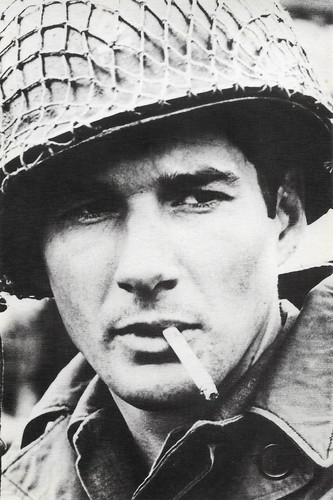
British postcard in the Photographs series, no. 104. Photo: publicity still for Yanks (John Schlesinger, 1979).
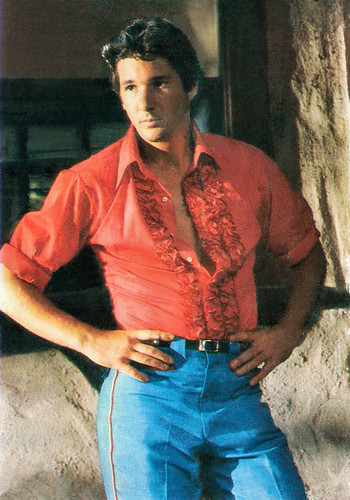
Italian postcard by Compagnia Distribuziona Europea. Photo: publicity still for Breathless (Jim McBride, 1983).
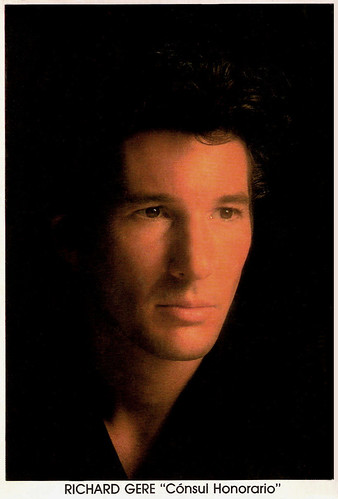
Spanish postcard in the 'Yo amo al Cine' series by Rovensa / Lauren Films. Photo: Lauren Films. Publicity still for The Honorary Consul (John Mackenzie, 1983).

Dutch postcard by Boomerang. Photo: Richard Gere and Jodie Foster in Sommersby (Jon Amiel, 1993).
In 1990 Richard Gere returned to the front row with two excellent films. In Internal Affairs (Mike Figgis, 1990), he was a sensation as the bad guy. Andy Garcia played an Internal Affairs agent who becomes obsessed with bringing down a cop (Gere) who manages to maintain a spotless reputation despite being involved in a web of corruption. Gere then teamed up with Julia Roberts to star in the smash romantic comedy Pretty Woman (Garry Marshall, 1990). His cool reserve as a ruthless businessman was the perfect complement to Julia's bubbling enthusiasm. The film captured the nation's heart, and Gere got his second Golden Globe Award nomination. Fans clamoured for years for a sequel, or at least another pairing of Julia and Richard. They got that with Runaway Bride (Garry Marshall, 1999), which was a runaway success. Gere received $12 million, and the box office was $152 million.
Off-screen, Richard and Cindy Crawford got married in 1991. They were divorced in 1995. Gere had a leading role in the Japanese film Hachi-gatsu no rapusodî (Akira Kurosawa, 1991), a film warning viewers of the dangers of nuclear power. Gere is also active in AIDS fundraising and agreed to play a small role in the HBO film And the Band Played On (Roger Spottiswoode, 1993) despite the prevalent belief in the film industry that a film about AIDS would be detrimental to his career. It was not. He co-starred with Jodie Foster in the box-office hit Sommersby (Jon Amiel, 1993). A Buddhist for over a decade, he was banned from the Oscars once after making anti-China comments on the air at the 1993 ceremony. Gere played one of his best roles in Primal Fear (Gregory Hoblit, 1996), as a fame-hungry lawyer who defends an altar boy (Edward Norton) accused of murdering a priest.
People magazine picked him as one of the 50 Most Beautiful People in the World in 1991, and in 1999 picked him as their Sexiest Man Alive. The following year, the actor enjoyed some of his best reviews as a gynaecologist at once devoted to and bewildered by all of the women in his life in the aptly titled Dr. T & the Women (Robert Altman, 2000). Critics noted that Gere seemed to have finally come into his own as an actor, having matured amiably with years and experience. After his divorce from Cindy Crawford, Gere started dating actress Carey Lowell. In 2000, they had a son, Homer James Jigme Gere. Jigme means 'fearless' in Tibetan. Gere and Lowell married in 2002. His later films include the thriller Unfaithful (Adrian Lyne, 2002) in which he reunited with Diane Lane, the Oscar-winning musical Chicago (Rob Marshall, 2002) with Renée Zellweger and Catherine Zeta-Jones, and the ballroom dancing drama Shall We Dance? (Peter Chelsom, 2004), which grossed $170 million worldwide.
In the comedy-drama The Hoax (Lasse Hallström, 2006), he played Clifford Irving who sold his bogus biography of Howard Hughes to a premiere publishing house in the early 1970s. Gere was one of the characters who embody a different aspect of Bob Dylan's life and work in I'm Not There (Todd Haynes, 2007). Other interesting films are the crime drama Brooklyn's Finest (Antoine Fuqua, 2009) with Don Cheadle, the British comedy-drama The Second Best Exotic Marigold Hotel (John Madden, 2015) with Judi Dench and Maggie Smith, and Three Christs (Jon Avnet, 2017) with Peter Dinklage. He was notably singled out for portraying businessman Robert Miller opposite Susan Sarandon in Arbitrage (Nicholas Jarecki, 2012), earning his fourth Golden Globe Award nomination.
Richard Gere is also an accomplished pianist, music writer, and above all a humanitarian. He's a founding member of Tibet House, a nonprofit organisation dedicated to the preservation of Tibetan culture. He has been an active supporter of Survival International, which supports tribal people, including the natives of the Amazon, the Maasai of East Africa, and the Wichi of Argentina. After 11 years of marriage, Richard Gere and Carey Lowell separated. Since April 2018, Richard Gere has been married to Spanish activist Alejandra Silva. His latest films include the romantic comedy Maybe I Do (Michael Jacobs, 2023) with Diane Keaton and Susan Sarandon and the upcoming comedy-drama Longing (Savi Gabizon, 2024) with Diane Kruger.
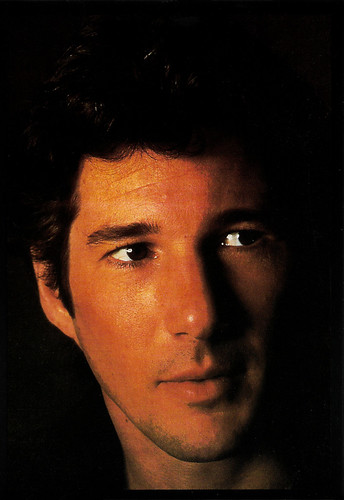
British postcard by Santoro Graphics Ltd., London, no. C237.

British postcard by Box Office, no. BOPC 3004. Photo: publicity still for American Gigolo (Paul Schrader, 1980).
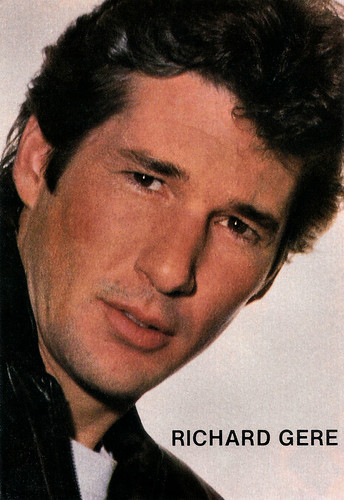
Spanish postcard.
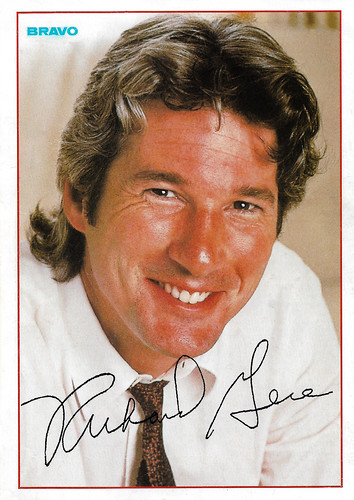
German autograph card by BRAVO, 1990.
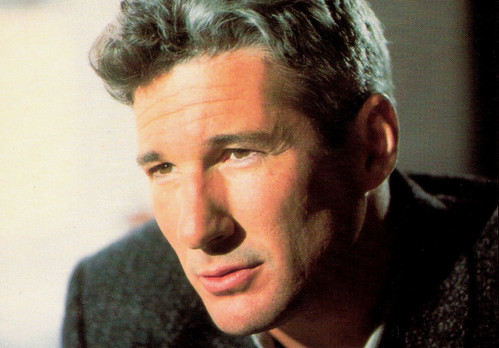
Italian postcard in the 'World Collection' series, no. P.c. 310. Photo: G. Neri.
Source: Sandra Brennan (AllMovie), K.D. Haisch (IMDb), Wikipedia and IMDb.
This post was last updated on 15 May 2024.

American postcard by Fotofolio, N.Y., N.Y. Photo: Herb Ritts. Caption: Richard Gere, San Bernardino, 1979. Courtesy Fahey / Klein Gallery Los Angeles. Proceeds of the sale of this card benefit The American Foundation For Aids Research.

French postcard by Editions Librairie Images'in, no J 19. Photo: publicity still for American Gigolo (Paul Schrader, 1980).

Italian postcard by Ediber-Angelus. Photo: publicity still for Breathless (1983) with Valerie Kaprisky.

Italian postcard in the Solo Belli series by Edizioni Eden, Milano, no. 1. Julia Roberts and Richard Gere in Pretty Woman (Garry Marshall, 1990).
A poetic biblical parable in the Texas Panhandle
Richard Tiffany Gere was born in 1949 in Philadelphia, Pennsylvania, USA. He was the second of five children of Doris Ann (Tiffany), a homemaker, and Homer George Gere, an insurance salesman, both Mayflower descendants. Gere had a strict Methodist upbringing. He started early as a musician, playing several instruments in high school and writing music for high school productions. He graduated from North Syracuse Central High School in 1967 and won a gymnastics scholarship to the University of Massachusetts in Amherst, where he majored in philosophy.
He left college after two years to pursue acting. Gere first worked professionally at the Seattle Repertory Theatre and Provincetown Playhouse on Cape Cod in 1969, where he starred in 'Rosencrantz and Guildenstern Are Dead'. He landed the lead role as Danny Zuko in the London production of the musical 'Grease' in 1973. While in London, Gere became one of the few Americans ever to work with Britain's Young Vic Theater, with which he appeared in 'The Taming of the Shrew'. He later reprised his role as Danny Zuko in Grease on Broadway. In 1974, Gere made his feature film debut with a tiny part in Report to the Commissioner (Milton Katselas, 1974). He returned to the stage the following year as part of the cast of an off-Broadway production of Sam Shepard's 'Killer's Head'.
Some of Gere's earliest photos, known as 'head shots' were taken by boyhood friend and struggling photographer Herb Ritts. The people handling Gere were so impressed with the photos that they began hiring Ritts for other assignments. Ritts became a top photographer. Onscreen, Gere had a few roles and gained recognition in Looking for Mr. Goodbar (Richard Brooks, 1977) opposite Diane Keaton. He played his first leading role in the dream-like drama Days of Heaven (Terrence Malick, 1978). Joshua Dysart at IMDb: "A poetic biblical parable played out in the Texas Panhandle at the turn of the century, it gives total preference to the emotion of imagery over the emotion of the actors. It's an exercise in feeling and seeing that's so successful it elevated Terrence Malick into the ranks of visual storytellers like Tarkovski and Kurosawa."
In Italy, Gere won the David di Donatello Award (the Italian Oscar) for Best Foreign Actor. Gere spent 1978 meeting Tibetans when he travelled to Nepal, where he spoke to many monks and lamas. Returning to the US, Gere won considerable theatrical acclaim for his performance as a gay concentration camp prisoner in the Broadway production of Martin Sherman's 'Bent'. For his role, he received the 1980 Theatre World Award.
Back in Hollywood, he played the title role in American Gigolo (Paul Schrader, 1980), which established him as a leading man and a sex symbol. His star status was reaffirmed by An Officer and a Gentleman (Taylor Hackford, 1982) with Debra Winger. The film grossed almost $130 million and won two Academy Awards out of six nominations. Gere himself received his first Golden Globe Award nomination. In The Cotton Club (Francis Coppola, 1984) he appeared with Diane Lane. In the early 1980s, Richard went to Honduras, Nicaragua and El Salvador amidst ongoing wars and political violence. With a doctor, he visited refugee camps. In the late 1980s, his career seemed to have a dip. His celebrity status was jeopardised with roles in the several poorly received biblical drama King David (Bruce Beresford, 1985) and the underrated political drama Power (Sidney Lumet, 1986).

British postcard in the Photographs series, no. 104. Photo: publicity still for Yanks (John Schlesinger, 1979).

Italian postcard by Compagnia Distribuziona Europea. Photo: publicity still for Breathless (Jim McBride, 1983).

Spanish postcard in the 'Yo amo al Cine' series by Rovensa / Lauren Films. Photo: Lauren Films. Publicity still for The Honorary Consul (John Mackenzie, 1983).

Dutch postcard by Boomerang. Photo: Richard Gere and Jodie Foster in Sommersby (Jon Amiel, 1993).
Capturing the nation's heart
In 1990 Richard Gere returned to the front row with two excellent films. In Internal Affairs (Mike Figgis, 1990), he was a sensation as the bad guy. Andy Garcia played an Internal Affairs agent who becomes obsessed with bringing down a cop (Gere) who manages to maintain a spotless reputation despite being involved in a web of corruption. Gere then teamed up with Julia Roberts to star in the smash romantic comedy Pretty Woman (Garry Marshall, 1990). His cool reserve as a ruthless businessman was the perfect complement to Julia's bubbling enthusiasm. The film captured the nation's heart, and Gere got his second Golden Globe Award nomination. Fans clamoured for years for a sequel, or at least another pairing of Julia and Richard. They got that with Runaway Bride (Garry Marshall, 1999), which was a runaway success. Gere received $12 million, and the box office was $152 million.
Off-screen, Richard and Cindy Crawford got married in 1991. They were divorced in 1995. Gere had a leading role in the Japanese film Hachi-gatsu no rapusodî (Akira Kurosawa, 1991), a film warning viewers of the dangers of nuclear power. Gere is also active in AIDS fundraising and agreed to play a small role in the HBO film And the Band Played On (Roger Spottiswoode, 1993) despite the prevalent belief in the film industry that a film about AIDS would be detrimental to his career. It was not. He co-starred with Jodie Foster in the box-office hit Sommersby (Jon Amiel, 1993). A Buddhist for over a decade, he was banned from the Oscars once after making anti-China comments on the air at the 1993 ceremony. Gere played one of his best roles in Primal Fear (Gregory Hoblit, 1996), as a fame-hungry lawyer who defends an altar boy (Edward Norton) accused of murdering a priest.
People magazine picked him as one of the 50 Most Beautiful People in the World in 1991, and in 1999 picked him as their Sexiest Man Alive. The following year, the actor enjoyed some of his best reviews as a gynaecologist at once devoted to and bewildered by all of the women in his life in the aptly titled Dr. T & the Women (Robert Altman, 2000). Critics noted that Gere seemed to have finally come into his own as an actor, having matured amiably with years and experience. After his divorce from Cindy Crawford, Gere started dating actress Carey Lowell. In 2000, they had a son, Homer James Jigme Gere. Jigme means 'fearless' in Tibetan. Gere and Lowell married in 2002. His later films include the thriller Unfaithful (Adrian Lyne, 2002) in which he reunited with Diane Lane, the Oscar-winning musical Chicago (Rob Marshall, 2002) with Renée Zellweger and Catherine Zeta-Jones, and the ballroom dancing drama Shall We Dance? (Peter Chelsom, 2004), which grossed $170 million worldwide.
In the comedy-drama The Hoax (Lasse Hallström, 2006), he played Clifford Irving who sold his bogus biography of Howard Hughes to a premiere publishing house in the early 1970s. Gere was one of the characters who embody a different aspect of Bob Dylan's life and work in I'm Not There (Todd Haynes, 2007). Other interesting films are the crime drama Brooklyn's Finest (Antoine Fuqua, 2009) with Don Cheadle, the British comedy-drama The Second Best Exotic Marigold Hotel (John Madden, 2015) with Judi Dench and Maggie Smith, and Three Christs (Jon Avnet, 2017) with Peter Dinklage. He was notably singled out for portraying businessman Robert Miller opposite Susan Sarandon in Arbitrage (Nicholas Jarecki, 2012), earning his fourth Golden Globe Award nomination.
Richard Gere is also an accomplished pianist, music writer, and above all a humanitarian. He's a founding member of Tibet House, a nonprofit organisation dedicated to the preservation of Tibetan culture. He has been an active supporter of Survival International, which supports tribal people, including the natives of the Amazon, the Maasai of East Africa, and the Wichi of Argentina. After 11 years of marriage, Richard Gere and Carey Lowell separated. Since April 2018, Richard Gere has been married to Spanish activist Alejandra Silva. His latest films include the romantic comedy Maybe I Do (Michael Jacobs, 2023) with Diane Keaton and Susan Sarandon and the upcoming comedy-drama Longing (Savi Gabizon, 2024) with Diane Kruger.

British postcard by Santoro Graphics Ltd., London, no. C237.

British postcard by Box Office, no. BOPC 3004. Photo: publicity still for American Gigolo (Paul Schrader, 1980).

Spanish postcard.

German autograph card by BRAVO, 1990.

Italian postcard in the 'World Collection' series, no. P.c. 310. Photo: G. Neri.
Source: Sandra Brennan (AllMovie), K.D. Haisch (IMDb), Wikipedia and IMDb.
This post was last updated on 15 May 2024.
No comments:
Post a Comment